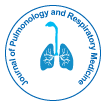எங்கள் குழு ஒவ்வொரு ஆண்டும் அமெரிக்கா, ஐரோப்பா மற்றும் ஆசியா முழுவதும் 1000 அறிவியல் சங்கங்களின் ஆதரவுடன் 3000+ உலகளாவிய மாநாட்டுத் தொடர் நிகழ்வுகளை ஏற்பாடு செய்து 700+ திறந்த அணுகல் இதழ்களை வெளியிடுகிறது, இதில் 50000 க்கும் மேற்பட்ட தலைசிறந்த ஆளுமைகள், புகழ்பெற்ற விஞ்ஞானிகள் ஆசிரியர் குழு உறுப்பினர்களாக உள்ளனர்.
அதிக வாசகர்கள் மற்றும் மேற்கோள்களைப் பெறும் திறந்த அணுகல் இதழ்கள்
700 இதழ்கள் மற்றும் 15,000,000 வாசகர்கள் ஒவ்வொரு பத்திரிகையும் 25,000+ வாசகர்களைப் பெறுகிறது
குறியிடப்பட்டது
- ICMJE
பயனுள்ள இணைப்புகள்
அணுகல் இதழ்களைத் திறக்கவும்
இந்தப் பக்கத்தைப் பகிரவும்
சுருக்கம்
Advances in Pulmonology: New Treatments and Technologies for Respiratory Diseases
Alastair J Moore
Respiratory diseases, such as asthma, chronic obstructive pulmonary disease (COPD), and lung cancer, continue to be a significant health burden worldwide. However, recent advances in pulmonology have brought about new treatments and technologies that offer hope for patients suffering from these conditions. One significant breakthrough in pulmonology is the development of biologic therapies for severe asthma. These therapies target specific pathways that contribute to asthma symptoms, such as inflammation and airway constriction. Biologics have been shown to reduce the frequency and severity of asthma attacks and improve lung function in patients who do not respond to traditional asthma treatments.
Another promising development in pulmonology is the use of bronchial thermoplastics (BT) for severe asthma. BT involves the delivery of thermal energy to the airways, reducing the amount of smooth muscle in the bronchial walls and decreasing airway constriction. Studies have shown that BT can improve asthma symptoms and reduce the need for rescue medications. COPD is another respiratory disease that has benefited from advances in pulmonology. The introduction of new inhalers that combine multiple medications, such as long-acting beta-agonists and muscarinic antagonists, has improved symptom control and reduced exacerbations in patients with COPD. Additionally, newer medications that target specific pathways involved in COPD, such as phosphodiesterase-4 inhibitors, have shown promise in reducing inflammation and improving lung function.
பாடத்தின் அடிப்படையில் இதழ்கள்
- இயற்பியல்
- இரசாயன பொறியியல்
- உணவு மற்றும் ஊட்டச்சத்து
- உயிர் மருத்துவ அறிவியல்
- உயிர்வேதியியல்
- கணிதம்
- கணினி அறிவியல்
- கால்நடை அறிவியல்
- சமூக & அரசியல் அறிவியல்
- சுற்றுச்சூழல் அறிவியல்
- தகவலியல்
- தாவர அறிவியல்
- நர்சிங் & ஹெல்த் கேர்
- நானோ தொழில்நுட்பம்
- நோயெதிர்ப்பு மற்றும் நுண்ணுயிரியல்
- புவியியல் மற்றும் பூமி அறிவியல்
- பொது அறிவியல்
- பொருள் அறிவியல்
- பொறியியல்
- மரபியல் & மூலக்கூறு உயிரியல்
- மருத்துவ அறிவியல்
- மருத்துவ அறிவியல்
- மருந்து அறிவியல்
- வணிக மேலாண்மை
- விவசாயம் மற்றும் மீன் வளர்ப்பு
- வேதியியல்
மருத்துவ & மருத்துவ இதழ்கள்
- அறுவை சிகிச்சை
- இதயவியல்
- இனப்பெருக்க மருத்துவம்
- இம்யூனாலஜி
- இரத்தவியல்
- உடல் சிகிச்சை மற்றும் மறுவாழ்வு
- எலும்பியல்
- கண் மருத்துவம்
- கண் மருத்துவம்
- காஸ்ட்ரோஎன்டாலஜி
- குழந்தை மருத்துவம்
- சிறுநீரகவியல்
- சுகாதாரம்
- தொற்று நோய்கள்
- தோல் மருத்துவம்
- நச்சுயியல்
- நரம்பியல்
- நர்சிங்
- நீரிழிவு மற்றும் உட்சுரப்பியல்
- நுண்ணுயிரியல்
- நுரையீரல் மருத்துவம்
- பல் மருத்துவம்
- மனநல மருத்துவம்
- மயக்கவியல்
- மரபியல்
- மருத்துவ ஆராய்ச்சி
- மருந்து
- மூலக்கூறு உயிரியல்

 English
English  Spanish
Spanish  Chinese
Chinese  Russian
Russian  German
German  French
French  Japanese
Japanese  Portuguese
Portuguese  Hindi
Hindi